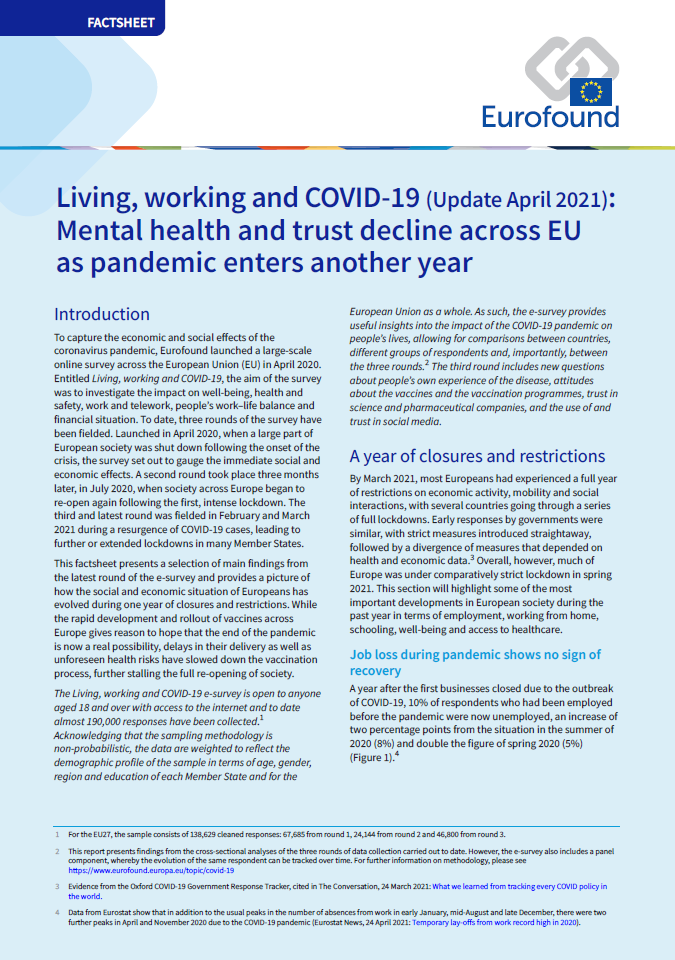
Den tredje runde af Eurofounds e-undersøgelse, som fandt sted i februar og marts 2021, kaster lys over den sociale og økonomiske situation blandt befolkningen i Europa efter næsten et helt år med covid-19-restriktioner. denne rapport analyserer de vigtigste resultater og følger den igangværende udvikling og tendenserne i de 27 EU-medlemsstater, siden undersøgelsen blev iværksat for første gang i april 2020. Den undersøger de problemer, der er dukket op under pandemien, såsom øget jobusikkerhed som følge af truslen om tab af arbejdspladser, faldende psykisk trivsel, udhuling af de seneste fremskridt i ligestilling mellem kønnene, faldende tillid til institutionerne, dårligere balance mellem arbejdsliv og privatliv, og stigende vaccineskepsis. Undersøgelsens resultater gør det klart, at det er nødvendigt med en helhedstilgang til at støtte alle de kriseramte grupper, hvis ikke de skal sakke yderligere bagud.
Key findings
Den psykiske trivsel i alle aldersgrupper er faldet til det laveste niveau, siden pandemien satte ind for over et år siden. Dette er særligt fremtrædende blandt unge og personer, som har mistet deres arbejde.
Eksisterende uligheder vokser på grund af pandemiens uforholdsmæssigt store konsekvenser for sårbare grupper. De, der i forvejen befinder sig i en usikker situation, har svært ved få det til at løbe rundt, viser resultaterne.
Borgernes tilfredshed med foranstaltningerne til krisestøtte er aftaget drastisk: kun 12 % føler nu, at støtteforanstaltningerne er rimelige, et fald fra 22 % i sommeren 2020. Andelen af dem, der opfattede støtten som let opnåelig og effektiv, faldt også — fra 16 % i sommeren 2020 til 10 % i foråret 2021. Næsten hver tiende respondent har fået afslag på en anmodning om økonomisk støtte.
Tilliden til institutioner er styrtdykket, især tilliden til de nationale myndigheder, som faldt fra 4,6 i sommeren 2020 til 3,9 i foråret 2021. I alle medlemsstater er tilliden til de nationale myndigheder lavere end det konstaterede niveau ved pandemiens begyndelse. Tilliden til EU faldt også, men er fortsat større end tilliden til de nationale myndigheder.
Over en fjerdedel af Europas befolkning erklærer sig skeptiske over for covid-19-vaccinen, hvor mænd er mere skeptiske (29 %) end kvinder (25 %). Vaccineskepsis hænger også stærkt sammen med den lave tillid og med brugen af sociale medier; der er således større vaccineskepsis i lande, hvor tilliden til myndighederne er lav.
Explore the dataset for each round of the survey.
The data cover a range of topics under seven main headings: quality of life, democracy and trust, work and teleworking, the financial situation and security of respondents, the quality of public services, the employment support measures put in place, as well as the willingness of Europeans to be vaccinated during COVID-19.
- Data: Quality of life during COVID-19
- Data: Democracy and trust during COVID-19 (new in round 3)
- Data: Working during COVID-19
- Data: Financial situation and security during COVID-19
- Data: Quality of public services during COVID-19
- Data: Support measures during COVID-19 (new in round 3)
- Data: Vaccinations during COVID-19 (new in round 3)
The report contains the following lists of tables and figures. The corresponding data for the tables and figures is available as an Excel download (328KB .xlsx).
List of tables
- Table 1: Location of work and average hours worked during the pandemic, EU27 (%)
- Table 2: Proportion of parents declaring they are too tired after work to do household jobs, EU27 (%)
- Table 3: Proportion of respondents reporting having negative feelings by age and gender, EU27 (%)
- Table 4: Request for support by employment status, EU27 (%)
- Table 5: Proportion of financially fragile respondents by employment status, EU27 (%)
- Table 6: Proportion of respondents reporting difficulties making ends meet by employment status, EU27 (%)
- Table 7: Proportion of respondents reporting arrears by group, EU27 (%)
- Table 8: Trust in the EU by sociodemographic group (mean scores), EU27 (%)
- Table 9: Trust in the national government and the EU by financial support (mean scores), EU27 (%)
List of figures
- Figure 1: Respondents who lost their job (of those who were employed before the pandemic) by country, EU27 (%)
- Figure 2: Preference to work from home post-pandemic, EU27 (%)
- Figure 3: Proportion of parents declaring they would like more online schooling for their children, even when the pandemic is over, EU27 (%)
- Figure 4: Risk of depression by age group and survey round, EU27 (%)
- Figure 5: Unmet need for healthcare during the pandemic by country, EU27 (%)
- Figure 6: Unmet need for healthcare by type of healthcare, spring 2021, EU27 (%)
- Figure 7: Requests for different types of support measures, summer 2020 and spring 2021, EU27 (%)
- Figure 8: Views about pandemic support measures, summer 2020 and spring 2021, EU27 (%)
- Figure 9: Views about pandemic support measures by country, spring 2021, EU27 (%)
- Figure 10: Proportion of respondents reporting difficulties making ends meet by country, EU27 (%)
- Figure 11: Pessimism about financial situation by economic situation, EU27 (%)
- Figure 12: Proportion of respondents stating that their financial situation will get worse, EU27 (%)
- Figure 13: Trust in institutions (mean scores), EU27 (%)
- Figure 14: Trust in the EU by country (mean scores), EU27 (%)
- Figure 15: Trust in national governments by country and survey round, EU27 (%)
- Figure 16: Stated intention to take vaccine by country, EU27 (%)
- Figure 17: Sociodemographic characteristics of people with vaccine hesitancy in Europe, EU27 (%)
- Figure 18: Reasons for vaccine hesitancy, EU27 (%)
- Figure 19: Trust in institutions among people who are vaccine hesitant and non-hesitant, EU27 (%)
- Figure 20: Vaccination hesitancy before and after 11 March 2021, EU27 (%)
- Infographic: Living, working and COVID-19
